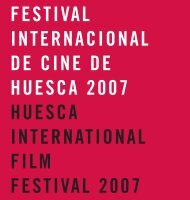A PEPE ESCRICHE - Festival de Cine de Huesca
A PEPE ESCRICHE - Festival de Cine de Huesca
A PEPE ESCRICHE - Festival de Cine de Huesca
Create successful ePaper yourself
Turn your PDF publications into a flip-book with our unique Google optimized e-Paper software.
26<br />
JURADO DEL CONCURSO IBEROAMERICANO JURY MEMBERS IBEROAMERICAN CONTEST<br />
Nacida en la ciudad <strong>de</strong> México. Se educa en el Sagrado Corazón <strong>de</strong>s<strong>de</strong> el kin<strong>de</strong>rgarten<br />
hasta la Universidad. A esta férrea educación religiosa le <strong>de</strong>be el sentido <strong>de</strong>l <strong>de</strong>ber, la<br />
culpa y el placer <strong>de</strong> lo prohibido. Estudia letras y Estudios Latinoamericanos. Ha impartido<br />
clases <strong>de</strong> Historia <strong>de</strong> América Latina, a<strong>de</strong>más <strong>de</strong> haber realizado una pléya<strong>de</strong><br />
<strong>de</strong> trabajos en toda índole y catadura siempre en el área <strong>de</strong> las ciencias sociales. Re<strong>de</strong>scubre<br />
la escritura –olvidada <strong>de</strong>s<strong>de</strong> su paso por las letras- cuando escribía guiones<br />
para cómics, televisión y radio culturales, enfocados en un principio en el género histórico,<br />
y paulatinamente se <strong>de</strong>dica más a la ficción. Es madre precoz <strong>de</strong> tres hijas. En<br />
los albores <strong>de</strong> 1985 conoce al director Arturo Ripstein, y en ese mismo año escriben<br />
en colaboración, El imperio <strong>de</strong> la fortuna. Des<strong>de</strong> entonces comparten casa y trabajo.<br />
La colaboración en las películas <strong>de</strong> Ripstein como guionista, continúan con: Mentiras<br />
piadosas (1988), La mujer <strong>de</strong>l puerto (1991), Principio y fin (1993), La reina <strong>de</strong> la noche<br />
(1994), Profundo carmesí (1996), El evangelio <strong>de</strong> las maravillas (1998), El coronel<br />
no tiene quien le escriba (1999), Así es la vida y La perdición <strong>de</strong> los hombres (2000),<br />
La virgen <strong>de</strong> la lujuria (2002) y El carnaval <strong>de</strong> Sodoma (2006). Colabora regularmente<br />
como asesora <strong>de</strong> guión en el Curso <strong>de</strong> Desarrollo <strong>de</strong> Proyectos Iberoamericanos <strong>Cine</strong>matográficos<br />
(Fundación Carolina/ Casa <strong>de</strong> América). Sus películas han obtenido<br />
numerosos premios entre ellos ha obtenido el León <strong>de</strong> Oro <strong>de</strong>l <strong>Festival</strong> <strong>de</strong> Venecia por<br />
Profundo Carmesí, La Concha <strong>de</strong> Oro al mejor Guión en el <strong>Festival</strong> <strong>de</strong> San Sebastián<br />
por La Perdición <strong>de</strong> Los Hombres; el primer Lugar en Concurso <strong>de</strong> Guiones <strong>de</strong> Nuevo<br />
<strong>Cine</strong> latinoamericano por la Reina <strong>de</strong> la Noche; el primer lugar en el concurso <strong>de</strong> guiones<br />
en el marco <strong>de</strong>l <strong>Festival</strong> <strong>de</strong> la Habana por Profundo Carmesí, entre varios más.<br />
Born in México City. Educated from kin<strong>de</strong>rgar<strong>de</strong>n to university at the Sagrado Corazón.<br />
To this strict religious education she owes a sense of duty, guilt and pleasure in the<br />
prohibited. She studied Arts and Latin American studies. She has lectured on Latin<br />
American history as well as having ma<strong>de</strong> an illustrious contribution to social sciences.<br />
She rediscovers literature – forgotten since her Arts day – when she writes scripts<br />
for comics, television and cultural radio, primarily focused in a historic genre, and<br />
gradually leans more towards fiction. She is the mother of three precocious daughters.<br />
In 1985 she meets Arturo Ripstein and in that same year they write the script for El<br />
imperio <strong>de</strong> la fortuna. Since then they have shared a home and work. Her work as<br />
scriptwriter in the films by Ripstein inclu<strong>de</strong>: Mentiras piadosas (1988), La mujer <strong>de</strong>l<br />
puerto (1991), Principio y fin (1993), La reina <strong>de</strong> la noche (1994), Profundo carmesí<br />
(1996), El evangelio <strong>de</strong> las maravillas (1998), El coronel no tiene quien le escriba<br />
(1999), Así es la vida y La perdición <strong>de</strong> los hombres (2000), La virgen <strong>de</strong> la lujuria<br />
(2002) y El carnaval <strong>de</strong> Sodoma (2006). She frequently contributes as a scriptwriter<br />
adviser for the Course in Development of Latin American <strong>Cine</strong>matographic Projects<br />
(Fundación Carolina/ Casa <strong>de</strong> Ámerica). Her films have received numerous awards,<br />
among them the Gol<strong>de</strong>n Lion at the Venice Film <strong>Festival</strong> for Profundo Carmesí, the<br />
Gold Shell for Best Script at the San Sebastian Film <strong>Festival</strong> for La Perdición <strong>de</strong> Los<br />
Hombres; first place in the script contest of New Latin American Films for Reina <strong>de</strong><br />
la Noche; first place in the script contest as part of the Habana <strong>Festival</strong> for Profundo<br />
Carmesí, among many more.<br />
FESTIVAL INTERNACIONAL DE CINE DE HUESCA 2008 HUESCA INTERNATIONAL FILM FESTIVAL 2008<br />
PAZ ALICIA<br />
GARCIADIEGO<br />
JAVIER<br />
TOLENTINO<br />
JURADO DEL CONCURSO IBEROAMERICANO JURY MEMBERS IBEROAMERICAN CONTEST<br />
Periodista. Licenciado en Ciencias <strong>de</strong> la Información por la Universidad Complutense<br />
<strong>de</strong> Madrid. Redactor <strong>de</strong> plantilla <strong>de</strong> los servicios informativos <strong>de</strong> RNE. Ha colaborado<br />
como profesor asociado con los <strong>de</strong>partamentos <strong>de</strong> Comunicación Audiovisual <strong>de</strong> la<br />
Universidad Carlos III <strong>de</strong> Madrid e instructor <strong>de</strong>l Master que la Universidad Complutense<br />
y Radio Nacional <strong>de</strong> España vienen organizando <strong>de</strong>s<strong>de</strong> hace quince años. Ha dirigido<br />
programas informativos en Radio 1 como La Jornada, Informe abierto y Siete días<br />
y <strong>de</strong>s<strong>de</strong> 1984, fecha en la que la radio le envía por primera vez al <strong>Festival</strong> <strong>de</strong> <strong>Cine</strong> <strong>de</strong><br />
San Sebastián, se ha mantenido vinculado a la información y opinión cinematográfica.<br />
En esta especialización periodística su labor la ha <strong>de</strong>sarrollado en Radio 3 y en El Ojo<br />
Crítico, equipo al que perteneció durante siete años hasta que le encomendaron programas<br />
esencialmente cinematográficos como De <strong>Cine</strong>, en Radio 1, El otro cine posible<br />
en Radio 5 y , sobre todo, El séptimo vicio en Radio 3. Espacio que se ha convertido<br />
en un clásico <strong>de</strong> nuestra radio y uno <strong>de</strong> los espacios más premiados y reconocidos<br />
(Premio <strong>de</strong> la Crítica (2000), el Puente <strong>de</strong> Toledo <strong>de</strong> Madrid (2001), el galardón <strong>de</strong><br />
Operas Primas <strong>de</strong> Guadarrama (2002) y el <strong>de</strong> Cáceres que otorgan los lectores <strong>de</strong> la<br />
publicación extremeña Versión Original (2003). Es autor <strong>de</strong> Julieta en el país <strong>de</strong> las<br />
maravillas (2003), libro <strong>de</strong>dicado a la figura <strong>de</strong> Norma Aleandro. Dirigido varios documentales<br />
para la radio sobre la figura <strong>de</strong>l autor vasco Jorge Oteiza (Lágrimas <strong>de</strong> Oteiza<br />
sobre la estela <strong>de</strong> Lesaca) que viene a ser la segunda parte <strong>de</strong> una trilogía que empezó<br />
con Miguel <strong>de</strong> Unamuno (Las geografías <strong>de</strong> don Miguel) y que finalizó con el cineasta<br />
sueco Ingmar Bergman (El <strong>de</strong>svelo amoroso en la obra <strong>de</strong> Bergman). Sus pinitos en<br />
el cine comienzan en el guión y dirección <strong>de</strong> un cortometraje (La noche que supe <strong>de</strong><br />
Peter Pan, 2006) y en las dificulta<strong>de</strong>s <strong>de</strong> poner en marcha un documental cuyo guión<br />
duerme hace tiempo en los cajones <strong>de</strong> algunas productoras españolas.<br />
Journalist. Graduated in Information Sciences at the University Complutense of Madrid.<br />
Writer of staff of the broadcasting services of RNE. He has worked as associate<br />
professor with the <strong>de</strong>partments of Audiovisual Communication of the University Carlos<br />
III of Madrid, and as instructor of Masters that the University Complutense and National<br />
Radio of Spain have been organizing for the last fifteen years. He has directed<br />
news programs in Radio 1 such as La Jornada, Informe abierto and Siete días, and<br />
since 1984, the year in which he is sent for the first time to the San Sebastián Film<br />
<strong>Festival</strong>, he has continued informing about cinematographic news. In this journalistic<br />
specialization, his work has evolved in Radio 3 and in El Ojo Crítico, team to which he<br />
was a part of until they entrusted him with cinematographic programs such De <strong>Cine</strong>,<br />
in Radio 1, El otro cine posible in Radio 5 and, above all, El séptimo vicio in Radio 3.<br />
A section that has become a classic in radio broadcasting as well as one of the most<br />
awar<strong>de</strong>d and recognized (Premio <strong>de</strong> la Crítica (2000), Puente <strong>de</strong> Toledo of Madrid<br />
(2001), Operas Primas of Guadarrama (2002), and an award from Cáceres that is<br />
given by the publication Versión Original (2003) from Extremadura). He’s the author of<br />
Julieta en el país <strong>de</strong> las maravillas (2003), book <strong>de</strong>dicated to Norma Aleandro. He has<br />
directed various documentaries for radio about the Basque author Jorge Oteiza (Lágrimas<br />
<strong>de</strong> Oteiza sobre la estela <strong>de</strong> Lesaca) which is actually the second part of a trilogy<br />
that began with Miguel <strong>de</strong> Unamuno (Las geografías <strong>de</strong> don Miguel) and finished with<br />
the Swedish filmmaker Ingmar Bergman (El <strong>de</strong>svelo amoroso en la obra <strong>de</strong> Bergman).<br />
His first steps into the movies began with the script and direction of a short film (La<br />
noche que supe <strong>de</strong> Peter Pan, 2006), and with the problems faced in setting up a<br />
documentary, whose script has been sitting in the drawers of some Spanish production<br />
companies for quite some time.<br />
FESTIVAL INTERNACIONAL DE CINE DE HUESCA 2008 HUESCA INTERNATIONAL FILM FESTIVAL 2008 27




